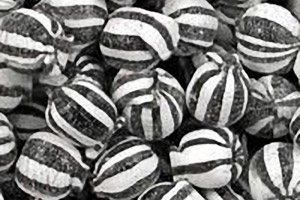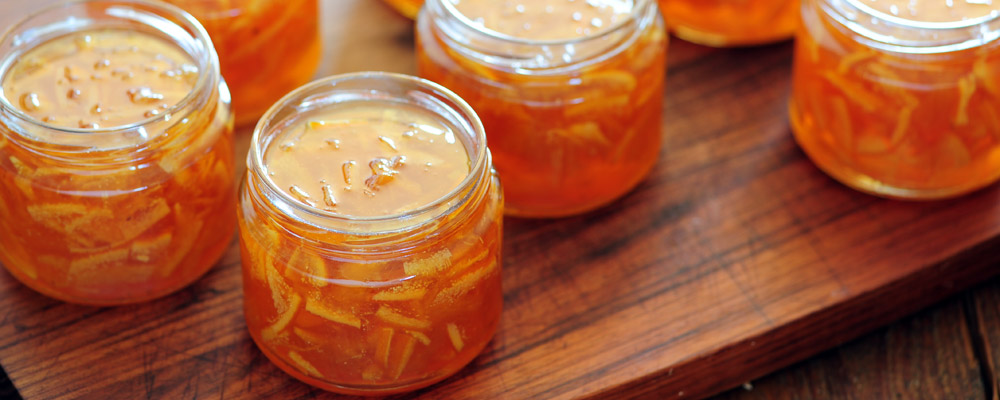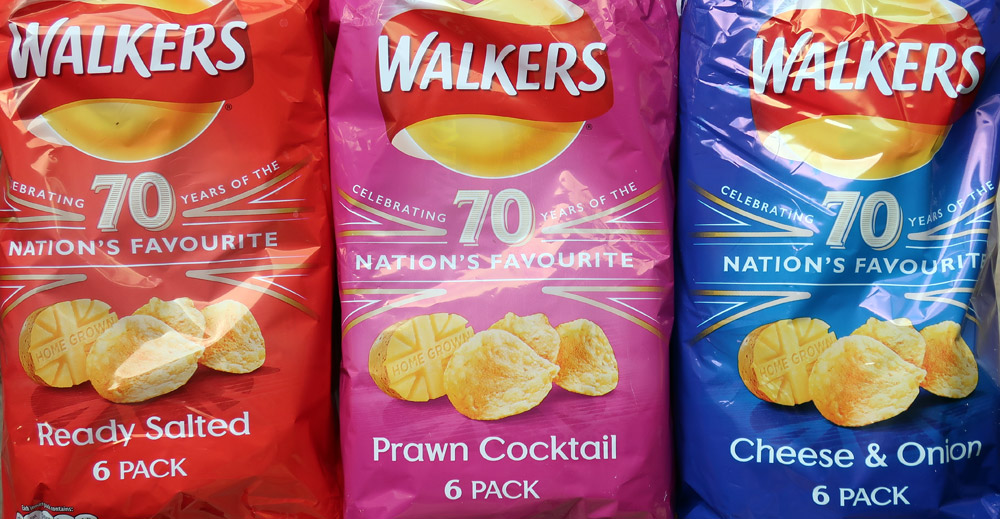Food souvenirs to buy in Britain for yourself or for friends and family who weren't lucky enough to go with you.
British Food Gifts - and Drink!
It's always nice to take home something as a memento of your trip to another country, both for yourself and as gifts for those back home who might appreciate something a little different. Here are some suggestions from a native as to what British food or drink to get as souvenirs and where to buy them from.I'm a big fan of buying food items as gifts, they can absolutely represent the country you have visited and will also be unlikely to be something tried by most people back home. If they are available back home, the chances are you'll have to search for them, have a very limited choice if you do find them, they'll be more expensive and possibly taste differently as they aren't made quite the same.
There's a good opportunity to personalize the gift according to the tastes of the recipient and it is less likely to be simply discarded as an odd reminder of somewhere someone else went to once. Here are some typical English and British food gifts suggestions as alternatives to the endless union flag items.
Gift shops v supermarkets and other grocers:
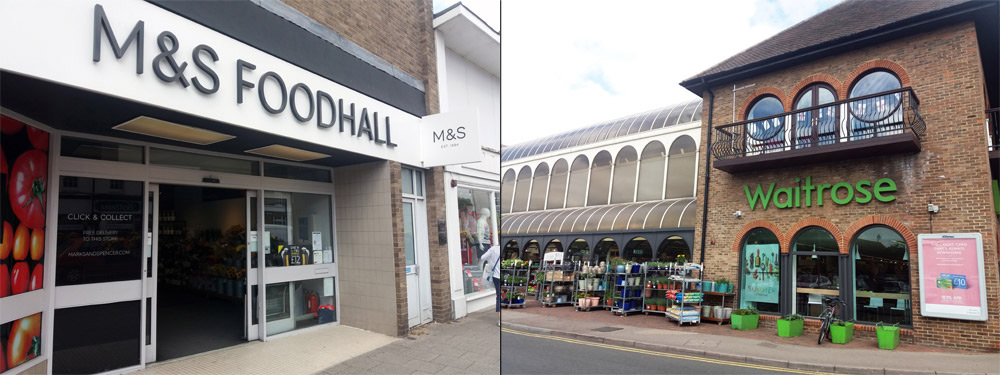
There are many food gifts in gift-shops often wrapped and presented more nicely than the ordinary food from everyday grocery shops. However.... I recommend that you don't get it from the gift shops and instead go to a grocery shop or supermarket as the quality of the food is often better, and it will be cheaper and fresher, I'm always suspicious when I see specifically gift-foods with very long sell by dates, much longer than normal, what do they put in to make it last so long?
Find a Waitrose supermarket (about 330 of them) or Marks and Spencer food hall (over 600). These are somewhat upmarket but still affordable food shops with many branches across the country. Many of their foods will cost less than those sold in gift shops and will be better quality too.
Small "whole foods" stores are good places to buy locally produced foods.
Gift shops I can recommend are the ones you will find at National Trust, English Heritage and Scottish Heritage properties if you visit them. They generally have a range of nicely labeled and packaged produce from the local area, often also from that actual property itself as some have a farm or working estate attached.
Chocolates and sweets (candy):
British chocolate is unlike European or American chocolate. You can get it anywhere, it's not too expensive and is a great gift for a chocolate fan. If you haven't tried it before, there are variety packs of smaller bars to get a taste of the options. While you can get British chocolate brands in other countries, it often tastes different (and not as good) to in the UK as it may be made locally under licence from different ingredients. A few suggestions:
-
Maltesers: milk chocolate covered
honeycomb balls.
-
Dairy milk: traditional British
milk chocolate bars.
-
Aero: chocolate bars with air bubbles,
totally changes the texture, try the mint.
-
Flake: a stick made of very thin
rippled chocolate. Stuck in an ice-cream it
makes it a "99" but no-one knows why.
-
Roses: selections of chocolates
with different flavoured centres.
-
Heroes: Individually wrapped bite
size mini-bars of the most popular Cadbury chocolate
bars.
- Celebrations: As with Heroes, but made by Mars.
There are dozens of different types of sweets from traditional and quirky, to more familiar international brands. if you want more then seek out a traditional "Sweet Shop", most small towns and upwards in size will have one.
-
Jelly Babies: Soft gummy sweets,
fruit flavoured, (too soft for my taste).
-
Liquorice Allsorts: Soft liquorice
and colourful err.. other stuff.
-
Turkish Delight: Rose flavoured
jelly, the British twist is that you can get
it covered in milk chocolate, bit of a love
/ hate thing. I love Turkish delight in all
flavours, I can't abide it covered in chocolate,
my wife loves the chocolate covered version.
-
Love Hearts: Small round fizzy
sweets in tubes, each has a little cheesy "love"
message on it.
My favourites are wine gums, midget gems, fruit gums and sports mixture, traditional chewy, fruit flavoured, fairly hard gummy sweets. If you're a fan of English literature it can be a time to try things you may have read about such as gobstoppers, humbugs and bull's eyes.
Tea:

It can be difficult to find proper British style tea outside of Britain (or Ireland), there is some stuff made by Liptons which you can find most places, but it's always disappointing and you never see it for sale here. There are endless little gift shop tins of tea with a union flag on them or shaped like a phone box, Big Ben, a Harrods van or similar which are quite nice in themselves, but as for the tea? no thanks. British style tea is of course not actually grown in Britain but imported, largely from Kenya, Uganda, Assam in India and Sri Lanka.
British tea is black tea and is almost always drunk with milk and possibly sugar or some other sweetener, you will have many opportunities to try it on your visit to England.
If you want to get some tea to take home that is actually drunk and enjoyed in Britain, then I recommend Yorkshire Tea, PG Tips or the slightly more upmarket offerings from Twinings, such as "Everyday", "English Breakfast" or my particular favourite, Darjeeling. If you want to deliver it in one of those tins, get an empty tin and fill it with tea from the supermarket. Most tea is now bought as bags, loose leaf is available but may be a little more difficult to seek out if you want a particular type.
Duchy of Cornwall originals:
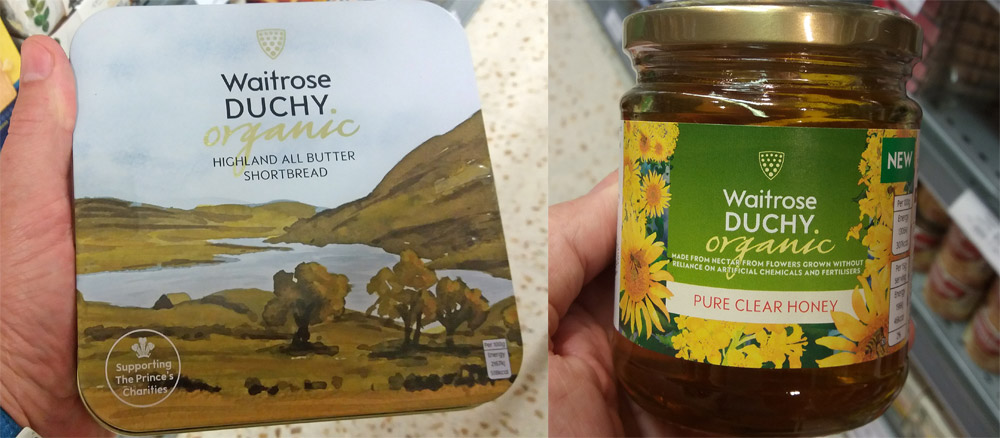
A company set up by Prince Charles, the Prince of Wales in 1990 to sell organic food products. It is now a brand that supplies a whole range of traditional British organic foods. Many of these are fresh produce such as meat and vegetables, but there are also things such as biscuits, honey, chutney and jam which make good gifts, partly because of their royal connection and partly because they are often attractively packaged in a way that you expect of a gift. They cost somewhat more than the equivalent "ordinary" brand, but usually less than you would pay for a similar item in a gift shop, and are nicer.
You can find this range in the supermarket chain Waitrose which has about 330 shops across the UK.
Marmalade:
A kind of jam (jelly) made from citrus fruits and containing thin slivers of softened peel, though peel-less versions are also available. Most commonly Spanish Seville oranges are used to make marmalade. It has a sweet/tart flavour with the pieces of peel giving extra texture, it is usually eaten at breakfast on toast (usually over a thin spread of butter) so you'll almost certainly be able to sample it during your stay here as it will be provided at the table.
There are many different varieties, the original Seville orange is the most popular, I like it with plenty of pieces of peel and I'm quite a fan of lemon marmalade too. There always seems to be at least one variety for sale with whisky flavouring which is positioned as a luxury version, personally I think the whisky flavour detracts rather than adds to it and rarely see anyone go for it when other options are available.
Cheese:
Britain produces over 700 different types of cheese of a whole range of different sorts but is most famous for cheddar which originated in the Somerset village of the same name in about the 12th century if not earlier. If you want to take some cheese home make sure at least some of it is cheddar, there are many different local varieties of it. Avoid the cheaper industrially produced cheese, you want some aged or vintage cheddar from a smaller producer to get the best, these are at the stronger or sharper end of the taste scale (and possibly beyond the taste scale you are used to) cheese counters will often let you have a small piece to try.
The other British specialty which is famous here but much less well known overseas is Stilton, this is a crumbly blue cheese with a strong flavour, it is akin to other blue cheeses but has its own unique character. If you are a fan of blue cheeses, make sure you try it.
European cheeses - if you are visiting from outside Europe and are taking cheese home I strongly suggest you take some European cheeses too which are readily found here. My own favourites that I have taken as gifts and have gone down well include French Brie-de-Meaux (brie of designated origin) and Italian Taleggio, if you are a fan of very strong cheese, then some French Époisses is a must (wrap it well in your luggage to keep the smell in!)
To transport cheese put it in a plastic sealable container, cheaply bought from the supermarket, and keep the cheese in the fridge until the last possible moment, then wrap it in the middle of your luggage surrounded by clothes for insulation and unpack it as soon as you can. You may also find cheese in decorative ceramic pots, stilton may be found like this, it's more expensive as you're paying for the pot too, but makes a nice gift.
Biscuits:

A great favourite is crumbly and delicious butter shortbread, made with butter (I bet you guessed that), cheaper shortcake is made with vegetable fat. There are a number of different shapes, petticoat tails which are circular with marked segments, scotty dogs, stars, animal shapes, Christmas shapes etc. The cheapest in terms of weight per unit cost are the simple fingers which are made to the same recipe and taste exactly the same but are a bit less special to receive.
Other British biscuits. The thing you need to understand about biscuits in Britain is that almost without exception, they were designed to accompany a cup of tea. So while they may seem a bit dry and hard in isolation, all is revealed when washed down with a cup of tea. Dunking biscuits in tea is widely practised, very short dunk times of about one second are recommended for beginners and debate rages over whether it is acceptable to dunk chocolate covered biscuits or not (clearly it is not). The repeat World Champion of dunkable biscuits is the "Rich Tea" as it demonstrates the greatest resilience and is least likely to end in the disaster scenario of half a biscuit falling into your tea. All biscuits can of course also be dunked into coffee.
As gifts, unless you have a particular favourite, there are tins and boxes of assorted biscuits at different price points and levels of poshness.
Chutneys and pickles:

Chutneys are made of fruit and / or vegetables mixed with sugar and vinegar as preservatives in a thick sauce which may be additionally flavoured with spices. An important component of a ploughman's lunch. Pickles have less sugar and often more oil, they are a different product altogether to simply pickled vegetables such as gherkins, onions and cucumber. Chutneys and pickles are a result of Indian influences using largely ingredients that grow in Britain. They are eaten in particular with cheese and cold meats, Indian style chutneys and pickles may be used to accompany spicy foods too.
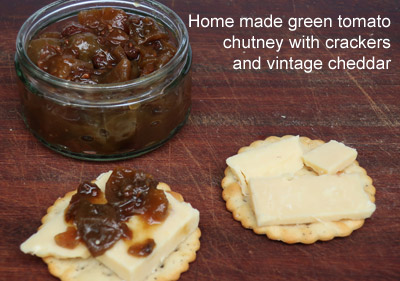 There
are endless varieties available, a few you may encounter:
red onion, tomato, plum, rhubarb, apricot
and ginger, green tomato and many more.
A mainstream mass produced best seller (deservedly
so) is Branston Pickle, but beyond
this any supermarket, National Trust gift shop,
cheese shop, delicatessen etc. will have a range
of chutneys and pickles in all kinds of flavours
and combinations. Indian style are widely available
and are made from more exotic fruit and vegetables,
they often have more spices. Widely available examples
are mango chutney (usually quite
a mild flavour), mango pickle, brinjal (aubergine)
pickle or lime pickle (usually strongly
flavoured and very spicy). Piccalilli
is a relish with fairly chunky vegetables made yellow
with mustard.
There
are endless varieties available, a few you may encounter:
red onion, tomato, plum, rhubarb, apricot
and ginger, green tomato and many more.
A mainstream mass produced best seller (deservedly
so) is Branston Pickle, but beyond
this any supermarket, National Trust gift shop,
cheese shop, delicatessen etc. will have a range
of chutneys and pickles in all kinds of flavours
and combinations. Indian style are widely available
and are made from more exotic fruit and vegetables,
they often have more spices. Widely available examples
are mango chutney (usually quite
a mild flavour), mango pickle, brinjal (aubergine)
pickle or lime pickle (usually strongly
flavoured and very spicy). Piccalilli
is a relish with fairly chunky vegetables made yellow
with mustard.
Honey:

Local honey can be bought all over the UK and so can be a good local food linked to specific area to buy as a souvenir. Supermarkets always have honey and may also have local produce, though you are more likely to find it in small wholefood shops or markets. If you have a hire car and are driving along country roads in the summer look out for small roadside stalls that are selling honey with a honesty box for payment, they may also have other things such as eggs and vegetables.
Beer:

There are many bottled beers widely available in Britain including selection packs of 4-6 different types from one particular brewery. If you're flying, then weight becomes an issue along with potential breakages. Recently there are more "real ales" and beers from micro-breweries available in cans which are lighter than bottles and less likely to break but are not quite as attractive a gift as bottles. Supermarkets generally have a good selection or look for an "off licence", a shop that sells alcohol to be consumed off the premises - as opposed to on the premises as with a pub.
Crisps:
Crisps, (you may know them as potato chips) are big business in the UK and are available in a wide range of flavours.
Some flavours are always available, others are trials for short periods or may be seasonal especially at Christmas. A large supermarket near to me has these flavours currently for sale amongst others: cheese and onion, flame grilled steak, prawn cocktail, sour cream and black pepper, bbq beef, smoky bacon, roast chicken, marmite, mango and chili chutney, Peking spare rib, wasabi and ginger, pulled pork, jerk chicken, goats cheese, red pepper, lime and coriander, Worcester sauce, chorizo and onion, ham and cranberry, tomato ketchup and more. Pickled-onion Monster Munch deserves a honourable mention and is worth seeking out.
They make a cheap, tasty and interesting gift, while they are somewhat bulky, they are lightweight so suitable if you are flying home. Put them in a shoe box in your luggage, or a plastic container or even small cardboard box from the supermarket.
Picture credits: Marmalade - courtesy - jules - used under CC BY 2.0 licence


